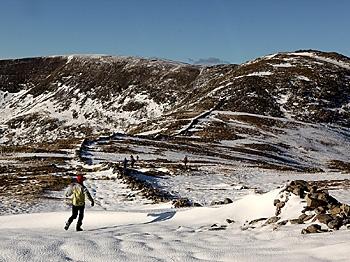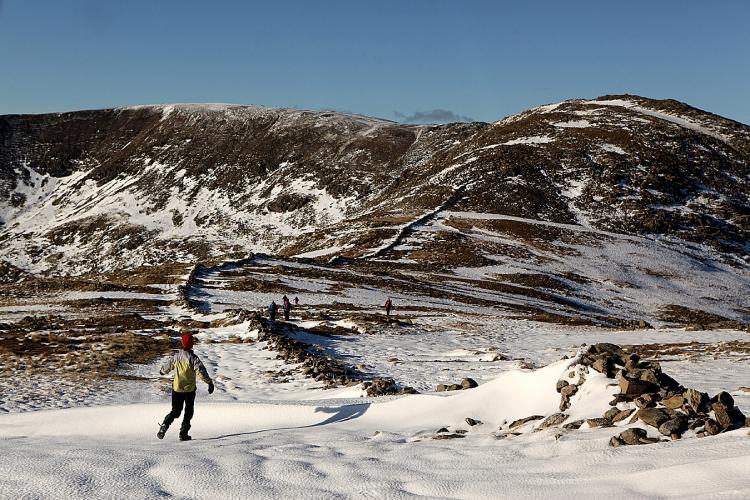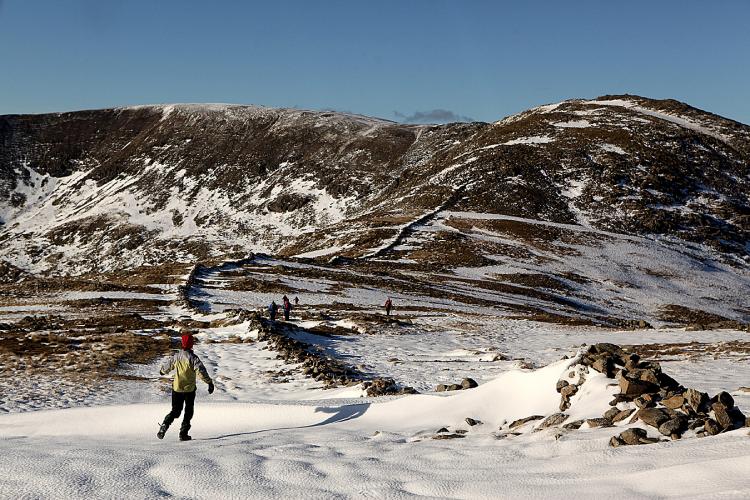The British sense of order prevails in a crisis. Should nuclear war erupt, an orderly queue will form by magic outside the bunker, with muted mutterings about those who let in friends (but we won’t say anything out loud). Cups of tea will materialize from hidden thermoses, people will bemoan the lack of biscuits, and we will swap small talk about the weather and bond over the warmth of ironic remarks about the end of the world.
The spirit of the Blitz will see us through.
Until it snows, that is.
The older generation says all you need to handle harsh winters is old-fashioned British grit and determination. But there is another kind of grit that’s needed too—the kind you sprinkle on roads. And we have a nasty habit of running out of it.
Last winter was supposedly the worst for a generation. I lost count of the days I spent with the children tobogganing because the school was shut.
And now, apparently, we are due for a repeat of last year’s once-in-a-lifetime winter (yes, something’s not right there).
Mollycoddled by the warm air current from the Caribbean, Britain might be on the same latitude as Canada, but its winters are comparatively mild. Sometimes there is little more than a light flurry of snow on a couple of days in February.
But when a harsher spell does come along, the country grinds to a halt, amid screaming tabloid headlines about our pathetic response.
My (Canadian) editor suggests we just need more snow ploughs. Well, that’s kind of what everyone here thinks too—until we discover that the kind of piping we use can’t cope with the cold; or the buses can’t get out of the garage because that street hasn’t been salted; or the trains can’t handle too much snow on the lines. Or the salt trucks can’t go out, because, erm, it’s too icy. Or they get stuck in the traffic that’s crawling at half a mile an hour because the roads, erm, need salting. (I kid you not!). Oh, and yes, we don’t have enough snowploughs. The whole mechanism of life below freezing that should kick in automatically, unnoticed, is a limp-wristed, damp squib.
Arguably, having everything in place to handle harsh winter weather on the whole really isn’t worth it here. Better a couple days of chaos every few years, than the cost of addressing all these issues.
But in recent years, the disruption has been expanded by the ever-more fractured nature of our daily lives.
Gone are the days when pupils, teachers, and parents all lived near to the school. Gone are the days when work, home, and play all took place in the same square mile.
Even if most of the pupils in the area can make it to the school, perhaps half of the teacher’s can’t. So that means the school is shut.
The more schools close down, the more parents are needed to stay at home, among them teachers, bus drivers, train drivers, and so on.
It’s a house of cards. Now, rather than waiting to see if the house might collapse in the morning, local councils think it is better to start a planned demolition the night before and announce the closure of all schools in the area.
So sometimes, the mere threat of snow that never comes to much brings everything to a standstill. Ah well, at least it appeals to the British sense of irony.
The spirit of the Blitz will see us through.
Until it snows, that is.
The older generation says all you need to handle harsh winters is old-fashioned British grit and determination. But there is another kind of grit that’s needed too—the kind you sprinkle on roads. And we have a nasty habit of running out of it.
Last winter was supposedly the worst for a generation. I lost count of the days I spent with the children tobogganing because the school was shut.
And now, apparently, we are due for a repeat of last year’s once-in-a-lifetime winter (yes, something’s not right there).
Mollycoddled by the warm air current from the Caribbean, Britain might be on the same latitude as Canada, but its winters are comparatively mild. Sometimes there is little more than a light flurry of snow on a couple of days in February.
But when a harsher spell does come along, the country grinds to a halt, amid screaming tabloid headlines about our pathetic response.
My (Canadian) editor suggests we just need more snow ploughs. Well, that’s kind of what everyone here thinks too—until we discover that the kind of piping we use can’t cope with the cold; or the buses can’t get out of the garage because that street hasn’t been salted; or the trains can’t handle too much snow on the lines. Or the salt trucks can’t go out, because, erm, it’s too icy. Or they get stuck in the traffic that’s crawling at half a mile an hour because the roads, erm, need salting. (I kid you not!). Oh, and yes, we don’t have enough snowploughs. The whole mechanism of life below freezing that should kick in automatically, unnoticed, is a limp-wristed, damp squib.
Arguably, having everything in place to handle harsh winter weather on the whole really isn’t worth it here. Better a couple days of chaos every few years, than the cost of addressing all these issues.
But in recent years, the disruption has been expanded by the ever-more fractured nature of our daily lives.
Gone are the days when pupils, teachers, and parents all lived near to the school. Gone are the days when work, home, and play all took place in the same square mile.
Even if most of the pupils in the area can make it to the school, perhaps half of the teacher’s can’t. So that means the school is shut.
The more schools close down, the more parents are needed to stay at home, among them teachers, bus drivers, train drivers, and so on.
It’s a house of cards. Now, rather than waiting to see if the house might collapse in the morning, local councils think it is better to start a planned demolition the night before and announce the closure of all schools in the area.
So sometimes, the mere threat of snow that never comes to much brings everything to a standstill. Ah well, at least it appeals to the British sense of irony.







